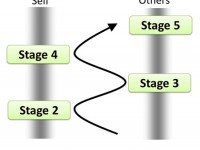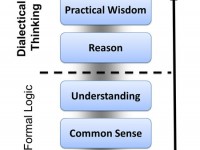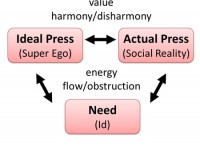The essence of the socio-emotional dimension has to do with how adults differ in making meaning of their life and work experiences based on their opposing and intertwined needs of being autonomous and being included in a community of others. These two lifelong tendencies achieve a different balance at every developmental “stage”. Social-emotional differences between people manifest not only in their “thinking”, but since thinking precedes acting, also in their goal setting, decision making, and, most directly, in the relationships individuals develop with others. In this life-changing course, students learn in depth not only the theory of social-emotional meaning making as developed by the Kohlberg School at Harvard, but acquire the practical skills of using what they learn, whether in making cogent assessments, giving cogent feedback, coaching, or consulting. Read More...
Author: Otto Laske
I am the founder and director of IDM, the Interdevelopmental Institute. My background is in philosophy, psychology, consulting, and coaching based on developmental theory to which I have mightily contributed myself. See the blogs at www.interdevelopmentals.org.
Cognitive Development Toward Dialectic
The essence of the cognitive dimension of CDF has to do with how adults differ in making cognitive sense (rather than meaning) of their life and work experiences, thus with what they do and do not understand about the real world. These differences go far beyond “what is in the head” since how people construct the world conceptually precedes their actions in the world, and thus equally manifests in their activities, planning, goal setting, decision making, and execution of leadership functions. In most general terms, students learn to switch from “what” to think to “how” to think, thereby gaining fluidity of thinking based on an awareness of their present way of thinking that makes some things “unthinkable” to them. In this life-changing course, students gain insight not only into the theory of cognitive development and the development of dialectic, but also begin to apply dialectical thought forms in text analysis, in cohort discussion, and in coaching interventions with individuals and teams. Read more Read More...
Dimensions of Clients’ Psychological Profile
In CDF, a person’s psychological profile is determined by evaluating answers to Morris Aderman’s Need/Press Questionnaire, a construct-validated questionnaire used in talent management, performance management, and promotion since 1970. The questionnaire is available on line in English, German, French, and Spanish (www.needpress.com). Questionnaire outcomes ideally complement social-emotional insight deriving from semi-structured interviews. The questionnaire embodies Henry Murray’s personality theory which is based on the notion of psychogenic (inborn) needs and associated pressures as defining a individual’s personality. In NP, clients’ profile is viewed in terms of three foci: self concept, approach to tasks, and interpersonal perspective (emotional intelligence.). Discussing these behavioural clusters in class tremendously helps students distinguish between what is “social-emotional” (developmental) and “psychological” in their own and in clients’ behavior and way of working with others. Students learn to make fine behavioral distinctions and observations; they also learn how to give appropriate and complex feedback to clients, weaving psychological insights into feedback on clients’ present social-emotional frame of reference. In CDF, a person’s psychological profile is viewed as the “glue” that holds his/her competences together, and also as a filter through which adult developmental resources pass on their way to inform the use of competences. In this course,... Read More...
Team Coaching from an Adult-Developmental Perspective
In this course, team leaders and team coaches acquire new competences pertaining to working with teams. Specifically, they learn to experience work with team members from a social-emotional perspective and therefore are able to discern different levels of team maturity. Immersing themselves in different ways of meaning making, they also come to understand that the cognitive level of discourse of a team, that is, complexity and fluidity of the discourse, is a function of team members’ maturity both in *thinking* and *meaning-making*. By sharpening their expertise for intuitive as well as reflective work with teams, participants prepare themselves for functioning at a higher level of leadership than they have so far been able to operate on. The practical highlight of the course is that participants are introduced to dialectical thinking, a form of holistic, systemic, and transformational reading of, and responding to, the real world. Although the practice of dialectical thinking in this course is not as extensive as in the subsequent case study, participants gain a fair foothold in reflecting on how, rather than what, team members think, and this gives them new tools for intervening with teams they lead or manage. It also opens a door for them... Read More...
Case Study I (a): Practicum in Social-Emotional Thinking and Listening
This course is focused on a single-client case study. It leads participants from merely talking about levels of meaning making to interactively determining them through semi-structured interview with a chosen client, and to documenting the client’s present meaning making based on 15 structurally relevant interview fragments. The program offers students the opportunity to show themselves and others that they have not only mastered “developmental theory”, but also know how to use it in practice. For the student, writing a case study involves: Completing a 1-hr semi-structured social-emotional interview Transcribing the interview(s) into English for discussion in the study cohort Selecting 15 structurally relevant fragments of the interview conducted Evaluating a Need/Press Questionnaire (guided by the instructor) Based on fragments of the social-emotional interview, presenting in class a coding sheet showing how the interview fragments are to be evaluated, for discussion in the study cohort At the end of the course, gathering and submitting all pertinent materials making up the case study to the Director of Education for personal feedback on scoring and focusing of client feedback. Read more Read More...
Case Study I (b): Practicum in Dialectical Thinking and Listening
This course leads participants from merely talking about dialectical thought forms to interactively eliciting them through a semi-structured interview and evaluating their use based on relevant fragments from a client interview. The program offers students the opportunity to show themselves and others that they have not only mastered “developmental theory”, but also know how to use it in practice. For the student, writing a the case study involves: Completing a 1-hr semi-structured cognitive interview following the protocol of the “Three Houses” (possibly in a modified form) Transcribing the interview(s) into English for discussion in the study cohort Selecting 30 structurally relevant fragments of the interview conducted Based on these fragments, presenting in class a coding sheet describing how the client’s cognitive profile is to be evaluated, for discussion in the study cohort At the end of the course, gathering and submitting all pertinent materials making up the case study to the Director of Education for personal feedback on scoring and focusing of client feedback. Read more Read More...


